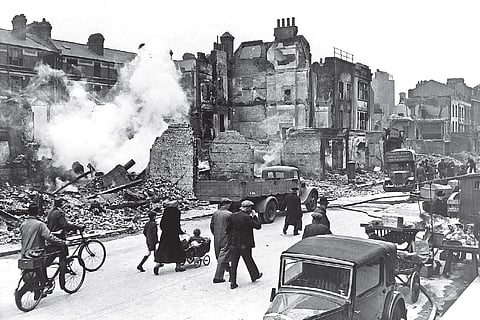Of Bomb Loves And Love Bombs
Some just out of wombs,
Some awaiting their tombs,
Both tied by a strange aplomb
Exhilarated watching the night sky
Lit up by many a bomb.
Exhilaration is one of the key words in Lara Feigel’s The Love Charm of Bombs: Restless Lives in the Second World War. It is September of 1940, when everyone in London, after years of war-preparation, has begun to think that the war is a hoax, and that London is not going to be bombed. London bombs Berlin, and Berlin replies more than befittingly, pounding London’s streets night after night. It is here that exhilaration comes in—people find a meaning to their existence in their resilience and community service. Morals, social manners, gender codes go through a sudden rupture, and there is rapture everywhere in the face of death.
Feigel, a historian by trade, and a raconteur by the narrative that she has laid before us in this book, traces the lives of five writers, some of who served as ARP wardens (Air Raid Protection) during this time. Among a tapestry of writers available to her, Feigel chooses Graham Greene, Henry Yorke (Henry Green was his pen-name), Elizabeth Bowen, Hilde Spiel and Rose Macaulay. All of them were married and four of them had relationships outside their marriages during this period. The exception is Spiel who had had a child just before the beginning of the Blitz. However, her own life had been quite colourful before her marriage to Peter de Mendelssohn.
Feigel’s book is not merely about these scandals, so to say, even though the title seems to suggest so. These relationships are a metaphors of both cracks in the social institutions, and great passion in the face of the fact of mortality. Feigel’s work is dense, delves into a lot of context of the war and how personally these writers were involved with such contexts. It throws up several characters, and shows how intertwined their lives were. Hilde and Peter, for example, had a child in the middle of the war, because of Peter’s exuberance that life must bloom in the midst of doom. Hilde’s experiences as a Jewish exile from Vienna also form an important part of the story and humanize London that seems too heroic at this time. Hilde’s father, who was a scientist and was due to immigrate to USA, is incarcerated on the assumption that any immigrant could be an agent. The point here being that Feigel robs all romance out of war-time London and war: the city is welcoming of, and yet sceptical of immigrants; wives are shifted to countryside, while the husbands fight fires heroically and also have sexual dalliances with young girls. Feigel does great work as a historian in balancing these various points of view and presenting a picture that is only too real. To pay her a compliment from words within her own book, one would quote what Bowen’s wartime lover Faolin had to say about her—she has “Turgenev’s triple trick of presenting reality to me as close-up as if it were a ball balanced on her five finger tips.” On the flipside, the work is a little too detailed and loses some of its pace due to the dense archival work.
Writers are also their own characters. They lead lives in a certain way commensurate with their conception of a certain character and watch themselves detached, for the plot to thicken. Feigel has understood this idea very well, and taken great pains to establish parallels between the lives of these writers and their writings during and after the war years. The sections about Greene and Henry are especially intriguing, with them having more agency as men, even during the war.
Both love and war are metaphors of each other, and there is an air of inevitability about the matter of being drawn into this vortex. Rose was a pacifist, having had been involved in the First World War and having seen the horrors of war as a nurse. She thought England should not participate in the war even if Hitler ran over it—an idea more extreme than Gandhian non-violence. She says all dead civilians and dead pilots are “part of the blind, maniac, primitive, stupid bestiality of war, into which human beings periodically leap, spitting in civilisation’s face.” However, Rose goes on to help as an ambulance driver, for “As I can’t be fighting in the war, I’ve got be fighting against it.’
We stand at the same platform that Rose Macaulay stood at in 1940, just that our platform may be much hotter without us realizing it. There’s a lot to munch upon, in this book.

